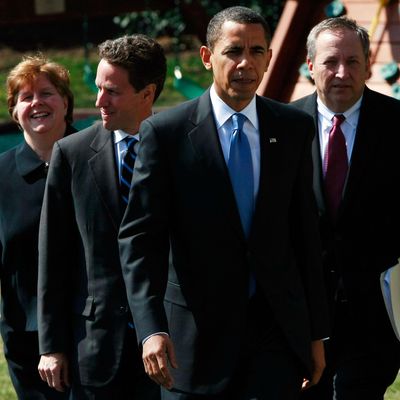
The largest question looming over Barack Obama’s presidency is what would have happened if he tried to push for a larger economic stimulus at the outset. Could he have gotten it passed? Did he think his plan was truly big enough, or just the biggest one he could pass?
In answer to that question, Noam Scheiber has acquired a major piece of the puzzle. While reporting his new book, The Escape Artists, which chronicles the administration’s response to the crisis, he got his hands on the fabled original version of Obama’s economic team’s 2008 memo, sort of the economic policy equivalent of the Blade Runner original cut. In the first version, Romer argues that a $1.8 trillion stimulus would be needed to fill in the anticipated output gap (which, in any case, turned out to be larger than anybody knew at the time.) But Larry Summers considered that figure unrealistically high — they would be laughed at by the political team — so the memo that reached Obama’s desk described an $850 billion stimulus as the largest possible option.
It’s a blockbuster find. It clearly demonstrates how Summers, an economist, censored the economic advice his boss received on purely political grounds. It’s important to keep in mind, though, that this still does not resolve the question of whether or not Obama could have gotten a larger stimulus.
Summers is shown here to be internalizing the calculations of White House political advisers, who in turn were internalizing the positions of senators who would be casting the decisive vote. Which is to say, the ultimate decision-making power here was where it always was: with Ben Nelson, Olympia Snowe, and Arlen Specter, the senators who stood at the decision-making point. It’s clearly those senators who were exerting the direct pressure to limit the cost of the stimulus, and the administration, including Summers, was responding to them.
The counterfactual is what would have happened if Obama had proposed a much larger stimulus to begin with. His political team believed it would have risked delaying the bill or caused it to collapse entirely. Perhaps. It’s also possible it would have simply shifted the frame of the debate, so that “large” was now defined by $1.8 trillion rather than $800 billion, and the “centrist” position would settle in at, say, a trillion and a half or thereabouts.
We can’t know the answer to that. But we do now know that Obama never really had the proper economic advice in his hands that would allow him to make this vital political judgment. And, of course, setting up a decision-making structure that allows Obama to make the best decisions is Obama’s own responsibility.






























